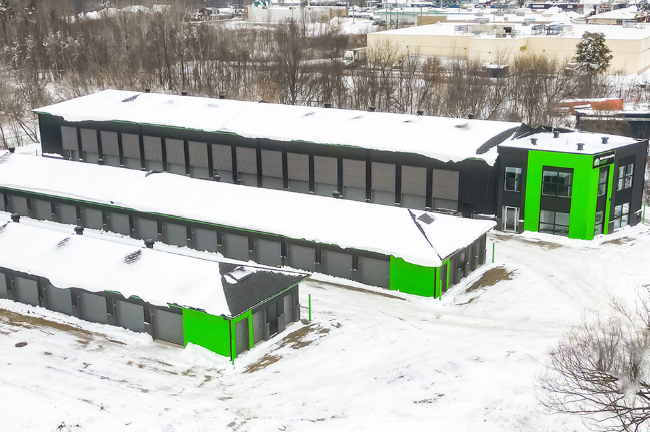Mini Storage Units
- Montreal
- Laval
- Saint-Jean-sur-Richelieu
- St-jérôme
- Mirabel
- Brownsburg Chatham
- St-Janvier
Regular Warehouses
- Saint-Jérôme
Why choose DMAX storage services over traditional storage?
DMAX Moving offers a flexible approach tailored to clients' real needs, combining moving service and storage. Here are the main differences:
- Combined moving and storage: No need to rent a truck or move your belongings yourself. Our team takes care of it.
- Professional loading and unloading: Safe handling to prevent damage and optimize space.

| Criteria | DMAX Moving | Traditional Storage Facility |
| Transportation included | Yes | No |
| Flexible duration | Yes | No |
| Enhanced security | Yes | No |
| Goods protection | Yes | No |
| Total cost | All-inclusive | Additional fees |
How to choose a storage service?
1. Selecting the Right Storage Unit Size
The required space depends on the volume of items to store. Here are some guidelines to help you choose:
- Small size (5x5, 5x10)
- Sufficient for a few boxes, clothing, or seasonal items.
- Suitable for people looking to free up some space at home.
- Medium size (10x10, 10x15)
- Can hold furniture and appliances from an apartment.
- Ideal for storing professional equipment or office supplies.
- Large size (10x20, 10x30)
- Suitable for the contents of a house or vehicle parking.
- Suitable for long-term storage or large volumes.

2. Choosing the Right Type of Storage for Your Needs
Depending on the items to store and the expected duration, several solutions exist:
- Standard storage: suitable for furniture, boxes and everyday items.
- Climate-controlled storage: recommended for items sensitive to temperature variations, such as electronics, documents and artwork.
- Outdoor storage: ideal for vehicles, seasonal equipment and bulky items.
- Short-term or long-term storage: some facilities offer flexible options for temporary or permanent needs.
3. Verify the Surveillance System and Facility Protection
- Surveillance cameras and controlled access: a good storage facility must have an active video surveillance system at all times and restricted access for tenants.
- Protection against moisture and pests: units must be ventilated and well-insulated to prevent water infiltration, mold, or rodent problems.
4. Compare Accessibility and Available Amenities
If you plan to store furniture or work equipment, choose a storage facility that offers easy access.
- Access hours: some facilities are open 24/7, while others have limited hours. Check if the access meets your needs.
- Handling equipment: the availability of carts, freight elevators and elevators makes it easier to move heavy or bulky items.
- Direct vehicle or elevator access: "drive-up" access allows you to load and unload directly from your vehicle, which is an asset for bulky items.
5. Choose a Convenient and Accessible Location
A well-located storage facility reduces unnecessary trips and simplifies logistics.
- Proximity to your home or business to avoid unnecessary trips.
- Accessibility via main roads and highways for faster transportation.
- Availability of a transportation service or truck rental, convenient for moving bulky items.
6. Compare Rates and Included Services
- Unit size: a small space costs less than a large warehouse or outdoor parking.
- Included services: some facilities offer 24/7 access, video surveillance and ventilation at no extra charge, while others charge for these options.
- Promotions and discounts: discounts are sometimes applied for long-term commitments or new registrations.
7. Identify Additional Fees Before Renting
Before signing a contract, verify:
- Insurance:
- Is it included in the price or must it be purchased separately?
- Some facilities require specific insurance, while others accept that your belongings are covered by your homeowner's insurance.
- Security deposit: required by some facilities, it is generally refundable at the end of the contract if the unit is in good condition.
- Late payment penalties: an additional charge may be applied in case of late payment.
- Price increases: some contracts include a rate increase after a few months, particularly after a promotional period.
- Cancellation fees: fees may apply if you wish to terminate the rental before the contract duration.
8. Check Customer Reviews Before Choosing
To choose a good storage service, consult:
- Online reviews: Google, Facebook and local forums provide an overview of a provider's strengths and weaknesses.
- The facility's reputation: a well-rated establishment inspires more confidence, especially if the reviews are detailed and recent.
- Feedback from other tenants: asking questions to customers who have already used the service helps avoid unpleasant surprises.
9. Explore Additional Services Offered
Some storage facilities offer convenient options that make storing and transporting goods easier:
- Packing supplies for sale: boxes, blankets, padlocks and other supplies to protect your items.
- Mobile storage: possibility of receiving a container directly at home before it is transferred to the warehouse.
- Handling or moving service: ideal for those who do not wish to manage transportation and loading themselves.
10. Location and accessibility
- Check accessibility and rental terms.
- Choose a unit suited to your needs in terms of size and options.
- Consult customer reviews to avoid bad experiences.
- Compare several facilities before making a decision.
What should you look out for with a storage service?
1. Facility Security
Verify that the facility is secure and monitored 24/7.
Beware of warehouses without cameras, controlled access or fences: risk of theft or vandalism.
Ask about the type of lock used (standard padlock or reinforced system).
2. Storage Conditions
Check if units are heated, ventilated and protected against moisture.
Beware of poorly maintained spaces: risk of mold, rodents or water infiltration.
If you are storing furniture, clothing or papers, make sure the place is not exposed to large temperature variations.
3. Pricing and Fees
Compare prices and what is included (insurance, access, opening fees).
Watch out for hidden fees:
- Administrative or processing fees.
- Automatic increase after a few months.
- Late payment penalties.
Check if there are promotions and if the price is guarantee
4. Access Conditions
Make sure the opening hours match your needs.
Some facilities limit access in the evening or on weekends: a problem if you need to retrieve an item urgently.
Check if the unit is easily accessible by car or if you need to carry your items by hand.
5. Contract Duration
Read the rental conditions carefully
- Minimum duration required?
- Can you terminate at any time?
- Are there cancellation fees?
Beware of rigid and long contracts (e.g. 6-month obligation when you only need 3 months).
6. Watch Out for Renewal Date and Flexibility
Check the contract renewal conditions: some mini storage facilities renew automatically every month.
Beware of fees if leaving mid-month: some facilities charge the entire month even if you leave just one day after the renewal date.
Choose facilities offering flexibility (prorated payment, reasonable notice).
7. Insurance
Check if insurance is included or mandatory.
Some facilities require you to purchase insurance through them (additional cost).
Check if your home insurance covers stored items; this can save you unnecessary fees.
8. Condition Inspection at Move-In
Ask to see the space before signing.
Do not accept a storage space that appears dirty, damp or poorly maintained.
Check the doors, locks, ventilation and wall integrity.
9. Customer Service Quality
Choose a company with good customer service and positive reviews.
Avoid facilities where it is difficult to speak to a manager in case of problems.
10. Location and Accessibility
Choose a warehouse close to home to avoid unnecessary trips, especially if you need to go there frequently.
Avoid facilities that are too far away, even if they are cheaper, as transportation costs and wasted time can cancel out the savings.
Check winter accessibility if the location is poorly maintained or in a remote area.
11. Facility Size and Organization
Some storage facilities are huge, with hundreds of storage spaces spread across multiple buildings.
Avoid facilities where you have to walk a long distance to reach your unit or use a narrow elevator with heavy loads.
Ask for a facility map and verify the exact location of your space before signing the contract. Check if you need a unit with an exterior door or if access is through the interior of the building.
In Summary: Pitfalls to Avoid
Insufficient security (no cameras, weak padlock).
Misleading pricing (temporary promotion, hidden fees, price increases).
Limited access (restricted hours, difficult access).
Rigid conditions (imposed long-term contract).
Poorly maintained units (moisture, rodents, poor insulation).
Automatic renewal and abusive billing if leaving after the deadline.
Oversized and disorganized facilities: difficult access to your unit.
Before signing, compare multiple options, visit the location and read the fine print of the contract.


